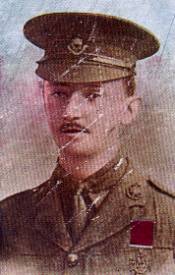Eric Archibald McNair
Eric Archibald McNair | |
|---|---|
 | |
| Born | 16 June 1894 Calcutta, British India |
| Died | 12 August 1918 (aged 24) Genoa, Italy |
| Buried | Staglieno War Cemetery, Genoa |
| Allegiance | |
| Service | |
| Rank | Captain |
| Unit | Royal Sussex Regiment |
| Battles / wars | World War I |
| Awards | Victoria Cross |
Eric Archibald McNair VC (16 June 1894 – 12 August 1918) was a British soldier. He was a recipient of the Victoria Cross, the highest and most prestigious award for gallantry in the face of the enemy that can be awarded to British and Commonwealth forces.
Biography
[edit]He was educated at Charterhouse School from 1907 to 1913, where he was Head of the School. He then went to Magdalen College, Oxford to study classics, though he left his studies shortly after matriculating to join the forces. While at Oxford he joined the Apollo University Lodge.
He was 21 years old, and a Temporary Lieutenant in the 9th (Service) Battalion, Royal Sussex Regiment, British Army during the First World War when the following deed took place for which he was awarded the VC.
For most conspicuous bravery. When the enemy exploded a mine, Lieutenant McNair and many men of two platoons were hoisted into the air, and many men were buried. But, though much shaken, he at once organised a party with a machine-gun to man the near edge of the crater and opened rapid fire on a large party of the enemy, who were advancing. The enemy were driven back, leaving many dead.
Lieutenant McNair then ran back for reinforcements, and sent to another unit for bombs, ammunition and tools to replace those buried.
The communication trench being blocked, he went across the open under heavy fire and led up the reinforcements the same way. His prompt and plucky action and example undoubtedly saved the situation.[1]
He later achieved the rank of Captain. He died of chronic dysentery at the base hospital in Genoa, Italy, on 12 August 1918.[2]
His Victoria Cross is displayed at the Eastbourne Redoubt Museum, Eastbourne, Sussex, England.
References
[edit]- ^ "No. 29527". The London Gazette (Supplement). 28 March 1916. p. 3409.
- ^ CWGC entry
External links
[edit]- 1894 births
- 1918 deaths
- People educated at Charterhouse School
- Royal Sussex Regiment officers
- British Army personnel of World War I
- British World War I recipients of the Victoria Cross
- British military personnel killed in World War I
- Deaths from dysentery
- Infectious disease deaths in Liguria
- British Army recipients of the Victoria Cross
- Freemasons of the United Grand Lodge of England
- British people in colonial India
- Burials in Italy
